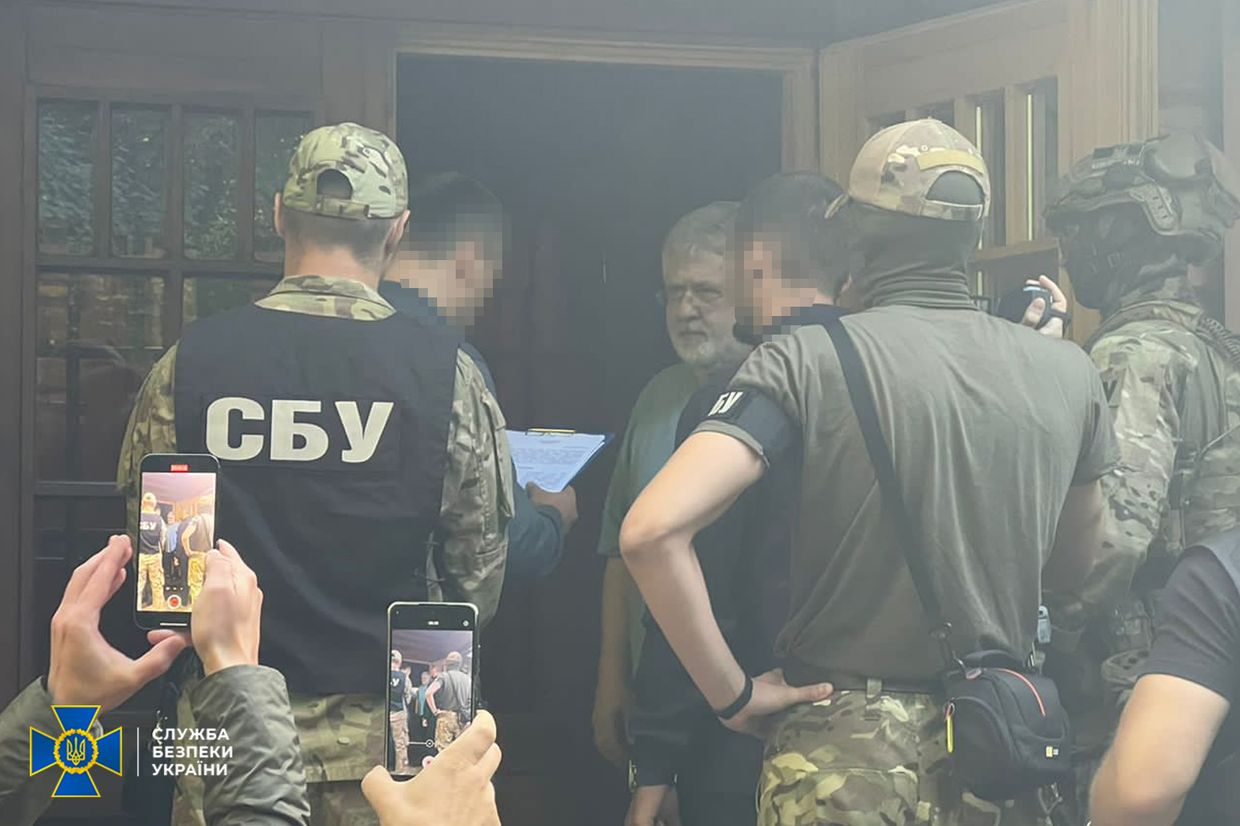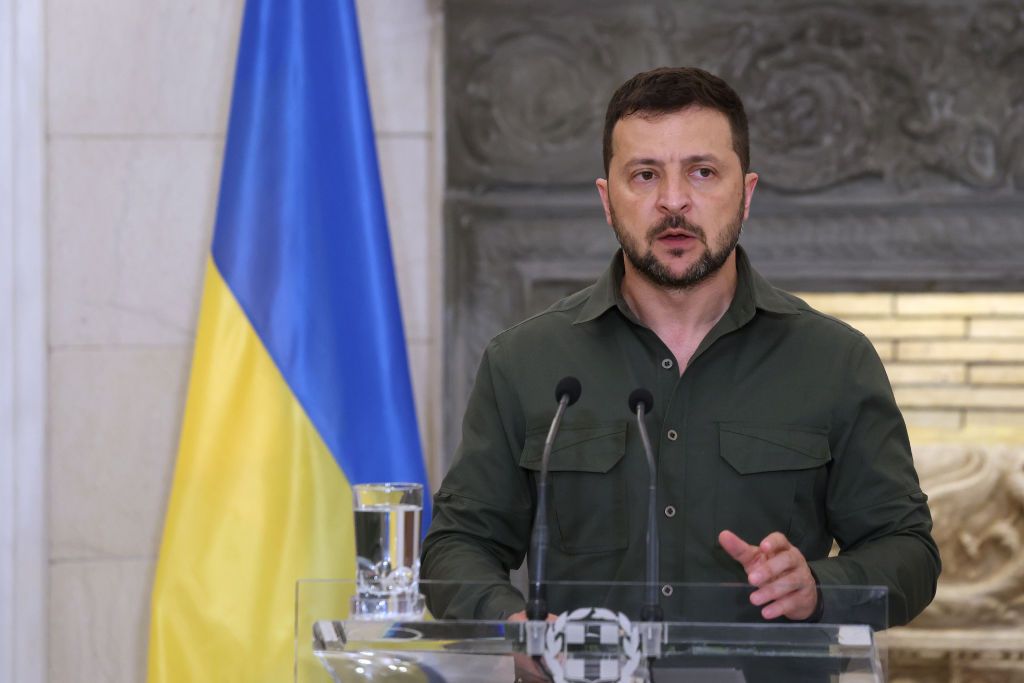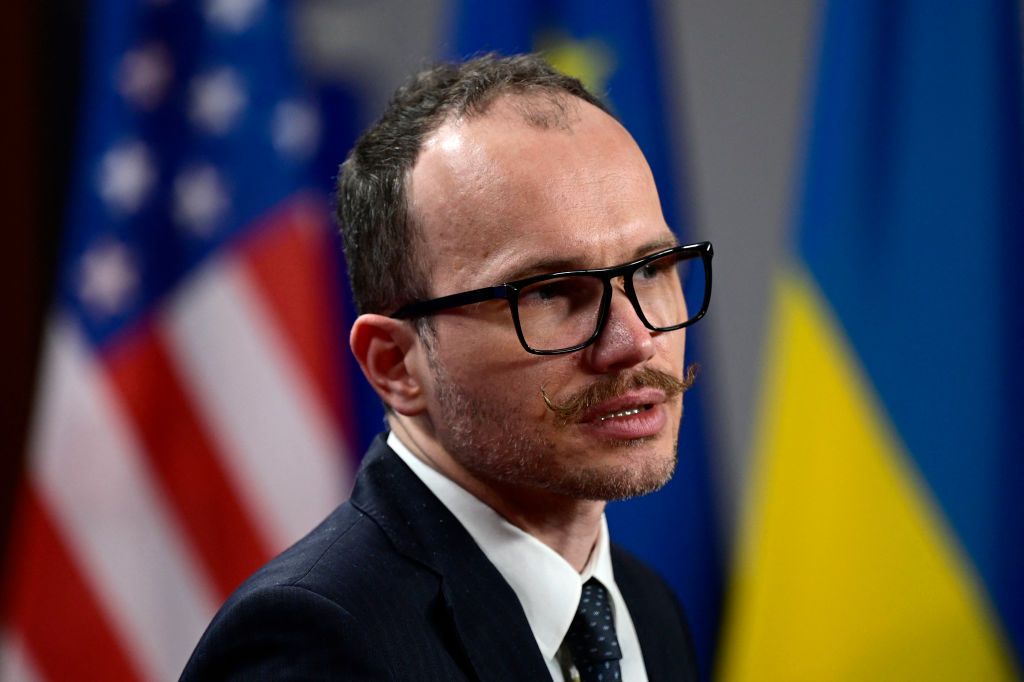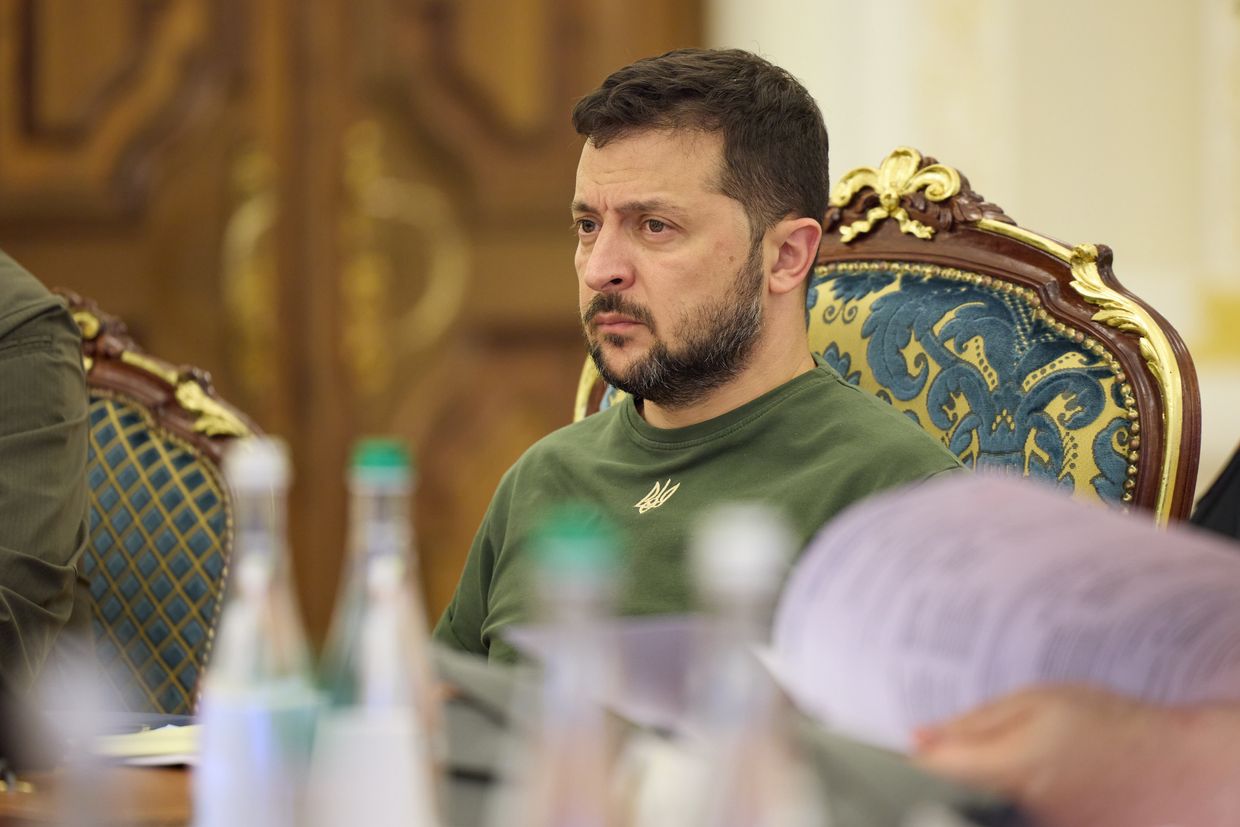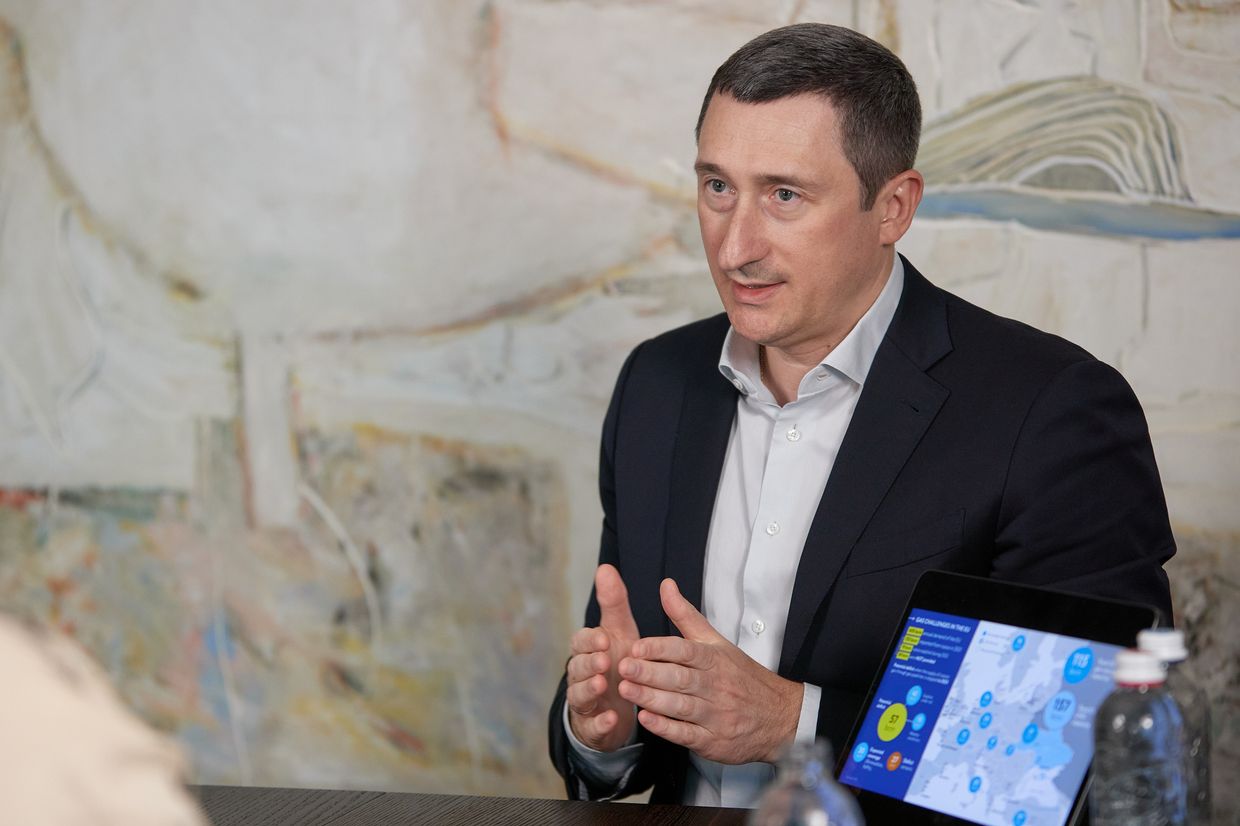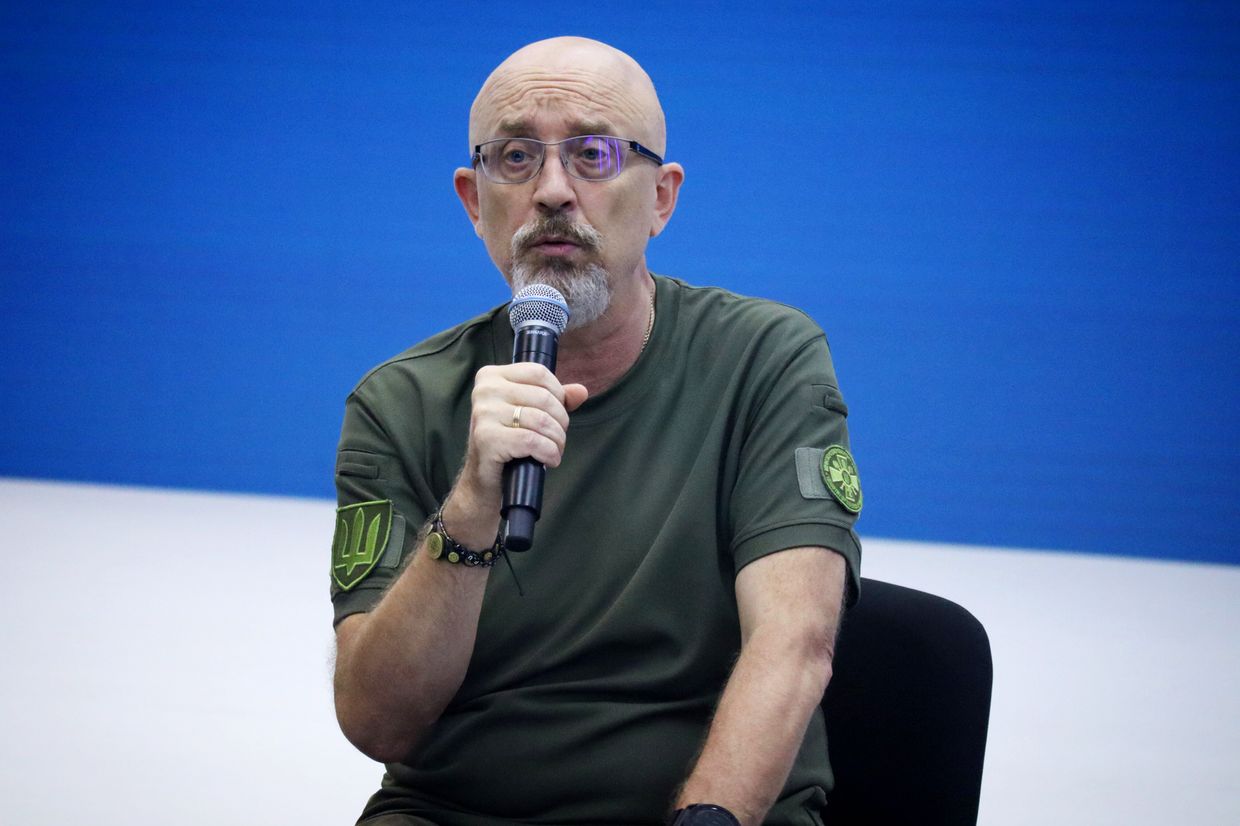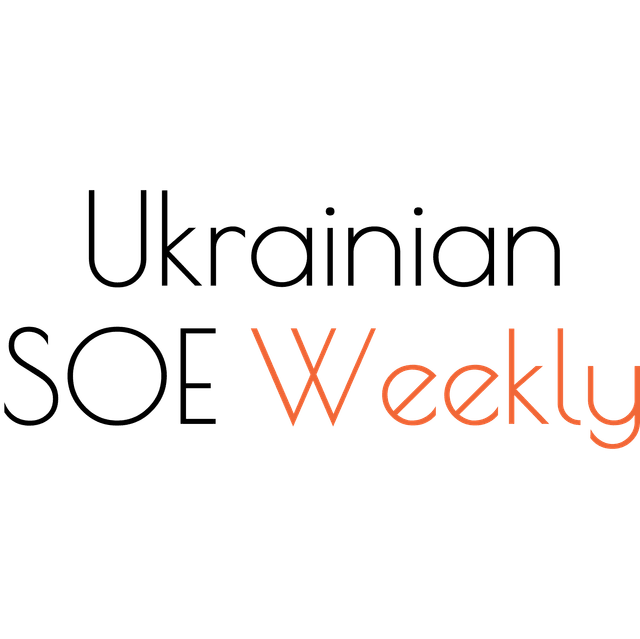Ukrainian State-Owned Enterprises Weekly – Issue 100

Editor’s Note: This is issue 100 of Ukrainian State-Owned Enterprises Weekly, covering events from August 12 – September 1, 2023. The Kyiv Independent is reposting it with permission.
Corporate governance of SOEs
Law merging GTSOU and MGU signed by the president, but not yet effective. On Aug. 30 President Zelenskyy signed the law on the corporate governance of the Gas Transmission System Operator of Ukraine (GTSOU). Law No. 3293-IX was known earlier as Draft Law No. 9311-1-d.
According to the information on the Verkhovna Rada’s website at the time of this writing, the law has not yet become effective. This is most likely because it has not yet been published in one of the official gazettes: Ofitsiyny visnyk Ukrayiny, Uryadovy kuryer, Holos Ukrayiny, or Vidomosti Verkhovnoyi Rady.
After being appropriately adopted and signed, laws of Ukraine must be promulgated in the official language in official printed gazettes within fifteen days, according to a relevant Presidential Decree.
That bill built on its earlier version, No. 9311-1, which had been proposed by MPs Maksym Khlapuk (Holos), Yaroslav Zheleznyak (Holos), and other MPs. Draft Law No. 9311-1 was drafted by two members of the SOE Weekly team, Oleksandr Lysenko and Andriy Boytsun.
In SOE Weekly Issue 89, we reported that Draft Law No. 9311-1 corrected the shortcomings of the government’s bill and aimed to help Ukraine meet its commitments to the IMF and other international obligations. See more in Issue 89.
Draft Law No. 9311-1 was then finalized by the Energy Committee of the Verkhovna Rada, becoming Draft Law No. 9311-1-d. That version was submitted by the Committee’s Chair Andriy Gerus (Servant of the People), Maksym Khlapuk (Holos), and other numerous members of the Committee.
The law allows for the appropriate implementation of corporate governance at GTSOU. There are two stages to this process.
First, Main Pipelines of Ukraine (MGU) is to be merged into GTSOU, disappearing as a separate entity. The Ministry of Energy gets the shareholder rights in GTSOU. The company then gets a new charter and a supervisory board as a governing body.
After the merger is completed, GTSOU’s new supervisory board should be appointed by Oct. 31. In the interim, the current members of MGU’s supervisory board will serve as GTSOU’s supervisory board.
The law was approved in the first reading in the Rada’s session on July 13, and then adopted in the second reading on July 28. See our Issue 98 for more.
In SOE Weekly Issue 97, we reported that Ukraine promised the IMF to complete the corporate governance reform of GTSOU by the end of October 2023.
Under that commitment, Ukrainian authorities must transfer GTSOU’s shares from MGU to the Ministry of Energy and adopt a new GTSOU charter.
The charter must be developed with Ukraine’s energy regulator and the Energy Community Secretariat and approved by the end of July 2023 (a structural benchmark, carried over from the original IMF Memorandum, which we discussed in Issue 82.)
When Law No. 3293-IX becomes effective, the Ministry of Energy will be in a position to amend GTSOU’s charter – in that way, meeting the IMF’s above structural benchmark, albeit more than a month overdue.
This will pave the way for a competitive, transparent, and merit-based nomination procedure for the new supervisory board. According to the IMF Memorandum, such a board should be appointed by the end of October 2023 (a new structural benchmark, added after the first review of the IMF program).
Ukrenergo’s supervisory board elects its chair. On Aug. 28, the supervisory board of Ukrenergo elected its independent member Daniel Dobbeni as the new chairperson.
According to the company, Dobbeni has more than 40 years of experience in the energy industry.
In 2008, he became the first president of the European Network of Transmission System Operators for Electricity (ENTSO-E). Dobbeni was also the president of Germany’s OSP 50Hertz GmbH and the vice-president and president of the GO15 association. From 2003 to 2012, he served as the CEO of the Belgian-German transmission system operator Elia Group.
In SOE Weekly Issue 95, we reported that Ukrenergo’s supervisory board appeared to have no chairperson and no committees.
In case of the board chair, this suggests that the board had to elect a chair every time for each of its meetings.
In case of board committees, this suggests that Ukrenergo’s supervisory board does not comply with the law. Specifically, the Law on Joint-Stock Companies requires that Ukrenergo should have at least an audit committee and a nomination and remuneration committee.
In addition, we reported that the Cabinet of Ministers has yet to select and approve one independent member for Ukrenergo’s supervisory board, more than a year after Dejan Ostojic’s termination of powers in April 2022.
According to Ukrenergo’s charter, the supervisory board should consist of seven members: four independent members and three state representatives.
According to the current information on Ukrenergo’s website, the supervisory board now has three independent members (Peder Andreasen, Daniel Dobbeni, and Roman Pionkowski) and three state representatives (Yuriy Boyko, Yuriy Tokarskyi, and Oleksandr Baraniuk).
Hence, independent members do not constitute a majority of the board, which does not meet the requirements of the law or Ukrenergo’s charter. Since April 2022, the Cabinet has not indicated why the missing independent member has not been appointed to date, or who that person would be. For more detail, see our Issue 95.
Sense Bank’s CEO resigns less than a month after appointment. On Aug. 14, Sense Bank reported that its CEO Dmytro Kuzmin resigned by mutual consent for personal reasons, and the supervisory board accepted his resignation.
According to the bank, the deputy CEO Olena Zubchenko would temporarily act as CEO. The supervisory board would begin selecting and appointing a new permanent CEO as soon as possible, Sense Bank added.
Earlier, Forbes Ukraine reported that Kuzmin might resign due to health problems and the new management’s “less than convincing performance” in the first weeks at the helm of the nationalized bank.
In SOE Weekly Issue 98, we reported that Sense Bank, previously owned by sanctioned Russian oligarchs Mikhail Fridman, Petr Aven, and Andrey Kosogov, was nationalized.
On July 23, the Individuals Deposit Guarantee Fund (DGF) appointed the supervisory and executive boards based on proposals from the Ministry of Finance, with the approval of the National Bank of Ukraine (NBU). On July 24, Sense Bank announced the start of work of the new executive and supervisory boards. See more in Issue 98.
Ukrzaliznytsia appoints CEO for its Polish subsidiary and the head of its representative office abroad. On Aug. 18, Ukrzaliznytsia reported that it appointed Oleksandra Vasylenko as the head of the company’s representative office abroad. Vasylenko will be in charge of all international activities of Ukrzaliznytsia.
According to the company, Vasylenko has served as director of the Department of Economic Diplomacy at the Ministry of Foreign Affairs since 2022. Prior to that, she worked as an advisor to the CEO of Ukrzaliznytsia and the Minister of Infrastructure, coordinating national transport initiatives.
Ukrzaliznytsia also appointed Mykhailo Plastun as the CEO of Ukrainian Railways Cargo Poland, Ukrzaliznytsia’s Polish subsidiary. According to Ukrzaliznytsia’s CEO Yevhen Lyashchenko, the main task for Ukrainian Railways Cargo Poland is to provide fast logistics for cargoes travelling from Ukraine.
In SOE Weekly Issue 97, we reported that on June 20, Ukrzaliznytsia established Ukrainian Railways Cargo Poland.
Ukrzaliznytsia’s press release stated that the company would operate 1,435- and 1,520-millimetre rolling stock, co-ordinating its work with European operators, cargo owners, and border crossings.
The Cabinet approves the appointment of a new CEO for the State Food and Grain Corporation. On Aug. 29, the Cabinet of Ministers approved Dmytro Gapchych as the CEO of the State Food and Grain Corporation of Ukraine (SFGC).
According to the media, in 2004-2012, Gapchych worked at Kernel Group agricultural holding.
In 2012, he became the CEO of Sugar Union Ukrros (a subsidiary of Kernel Group). At the end of 2013, he left Kernel at his own initiative.
From April 30, 2020, Vasyl Kovalenko was the acting CEO of SFGC.
In mid-January 2022, SOE Weekly Issue 61 reported that MP Maryan Zablotskyy (Servant of the People faction) wrote on his Facebook page that SFGC might go bankrupt soon. According to Zablotskyy, SFGC was unlikely to repay its next $95 million loan tranche on its own.
Later, Ekonomincha Pravda (EP) explained how SFGC’s debts accrued and claimed that the company would default on its debt on Jan. 21, 2022. According to EP’s sources, the President’s Office supported a “default scenario," which would automatically invoke a state guarantee.
In Issue 63, we reported that the Ministry of Finance transferred Hr 2.5 billion ($67 million) to the Export-Import Bank of China instead of SFGC in January 2022. According to the Ministry, SFGC repays a loan instalment every six months. As of Jan. 21, 2022, the company paid just $8.8 million of the $96.4 million it was supposed to. Due to the state guarantee, the Ministry of Finance had to pay the rest.
In Issue 68, we reported that in December 2022, the Cabinet of Ministers approved the state guarantee to repay the SFGC’s $1.5 billion loan from the Export-Import Bank of China.
Energy sector
Ukrnafta pays over Hr 12 billion ($323 million) in taxes for the first six months of 2023. On Aug. 29, Ukrnafta’s CEO Sergii Koretskyi reported that the company paid Hr 12.32 billion ($332 million) in taxes.
According to Koretskyi, Ukrnafta paid Hr 1.2 billion ($32 million) of income tax for the first quarter and Hr 2.07 billion ($55 million) for the second quarter of 2023.
In SOE Weekly (Issue 90), we reported that Ukrnafta’s financial plan for 2023, approved by the Cabinet of Ministers, expects Hr 74 billion ($1.2 billion) in net income from operations, Hr 12 billion ($323 million) in net profit, and Hr 25 billion ($673 million) in tax payments to the state.
As we also reported in Issue 90, Koretskyi said that Ukrnafta earned about Hr 7 billion ($188 million) in net profit in January-April 2023. This figure was most likely unaudited. We had not been able to identify any official reporting on profits. We had also not been able to find Ukrnafta’s financial statements for 2022.
CASE-Ukraine contests Ukrnafta CEO’s statements on profits and transparency. In his column for Forbes Ukraine, CASE Ukraine’s economist Vasyl Povoroznyk contested Koretskyi’s statements on the company’s quarterly profits, lower costs, higher production, and transparency.
Povoroznyk said that Ukrnafta’s financial statements for the first three months of 2023 were not publicly available, but he referred to Naftogaz’s consolidated financial statements for that period (unaudited). As Ukrnafta’s majority shareholder, Naftogaz consolidates Ukrnafta’s reporting in its financial statements.
Povoroznyk said that Ukrnafta’s profit was Hr 3.5 billion ($94 million) in the first quarter of 2023, which is lower than the figure that Koretskyi had named, Hr 4.3 billion ($116 million).
Naftogaz’s financial reporting also did not support Koretsky’s statement that Ukrnafta has cut costs, Povoroznyk said. On the contrary, the cost of goods sold increased from Hr 7.5 billion ($202 million) in the first quarter of 2022 to Hr 9.6 billion ($258 million) in the first quarter of 2023, while sales expenses increased from Hr 900 million ($24 million) to Hr 1.3 billion ($35 million) in the respective periods, he claimed.
Povoroznyk concluded that cutting expenses was not the main driver of Ukrnafta’s financial performance – instead, the results were driven by an increase in revenue, which grew from Hr 9.6 billion ($258 million) to Hr 15.6 billion ($420 million).
According to him, sales of petroleum products form the bulk of the company’s revenue. He attributed the 63% increase in Ukrnafta’s revenue in the first quarter to higher market prices for petrol and diesel (45% and 54%, respectively).
Povoroznyk added that another major reason for the revenue growth was the sale of gas from underground storage facilities. According to him, in March 2022, Naftogaz’s subsidiary Ukrtransgaz and Ukrnafta settled the issue of 0.591 billion cubic metres of natural gas stored by Ukrtransgaz. This is a pre-trial settlement of a part of Naftogaz’s “debt” – the 9 billion cubic metres of gas produced in 2006-2012, for which Ukrnafta is suing Naftogaz, he explained.
The previous management of the company did not sell this gas, and the new management probably sold part of this stock, increasing its revenue, Povoroznyk argued. He said that this gas was sold at current market prices (between Hr 17,000-20,000 excluding VAT according to the Ukrainian Energy Exchange quotes), while Ukrnafta had received it at a historical cost (between Hr 800 and 1,400 depending on the period). Povoroznyk suggested that this difference contributed largely to Ukrnafta’s record profit in the first quarter of 2023.
He also added that it was important how Naftogaz would settle its remaining debt for gas to Ukrnafta (8.5 billion cubic metres). If Naftogaz were to repay it at the current market value, Ukrnafta would receive an asset worth more than Hr 100 billion (at the market price in Ukraine of $300-400 per 1,000 cubic meters excluding VAT), Povoroznyk claimed.
He also warned against potential corruption risks related to this asset if Ukrnafta’s corporate governance were to remain opaque.
Naftogaz takes over another three of Firtash’s gas distribution companies. On Aug. 15, Gas Distribution Networks of Ukraine LLC (Gazmerezhi brand), a Naftogaz subsidiary, reported that Ivano-Frankivskgaz, Khmelnytskygaz and Mykolaivgaz joined Naftogaz Group.
These gas distribution companies were part of fugitive oligarch Dmytro Firtash’s Regional Gas Company (RGC) Group.
In SOE Weekly Issue 71, we reported that Naftogaz changed the management of regional gas distribution companies Kharkivgaz and Dniprogaz on Jan. 16. Both were also part of Firtash’s RGC Group.
RGC accused Naftogaz of an “attempted raid." In response, Naftogaz referred to the Cabinet of Ministers’ Decision No. 429-r dated May 28, 2022, which transferred the corporate rights of about 20 regional gas distribution companies to its subsidiary Chornomornaftogaz.
Earlier in May 2022, Kyiv’s Pechersk Court seized shares of Firtash’s regional gas companies because they evaded payment for the use of gas networks. (After that, the Cabinet transferred these rights to Chornomornaftogaz.) RGC then filed lawsuits to overturn the Pechersk Court’s decision. This delayed the process of changing management significantly.
In September 2022, Naftogaz established a new subsidiary named Gas Distribution Networks of Ukraine LLC to consolidate the regional gas distribution companies.
In Issue 98, we reported on another wave of taking over Firtash’s gas distribution companies. See more in Issue 98.
Naftogaz CEO interviewed. Naftogaz’s CEO Oleksiy Chernyshov was interviewed last week by Ekonomichna Pravda (EP). We selected the key points.
On financial performance:
“Naftogaz’s financial result for 2022 is Hr 37 billion ($1 billion) in losses. However, for the first half of 2023, we expect about Hr 2 billion ($54 million) in profit (the accounts are still being audited). The loss for the first half of 2022 was Hr 18 billion ($487 million).”
We have not been able to locate Naftogaz’s financial statements for 2022 on its website or elsewhere in the public domain.
In Issue 99, we reported that Naftogaz paid over Hr 48 billion ($1.3 billion) in taxes for the first seven months of 2023.
In Issue 85, we reported that the Cabinet of Ministers established how much SOEs must pay in dividends for 2022. Naftogaz must allocate 30%, and the rest of the profit must be used to purchase natural gas produced in Ukraine.
In Issue 77, we reported that Naftogaz expected to post a loss of Hr 40 billion ($1.1 billion) in 2022, according to preliminary results. As we said, if Naftogaz were to get losses, it would not pay any dividends, which seems to be confirmed now based on Chernyshov’s interview.
On gas reserves in underground storage facilities:
“The vast majority of gas in the storage facilities is Ukrainian gas, while the rest is from non-residents. As for the structure of the volumes, I cannot disclose details, in particular due to security issues and to protect commercial secrets, in particular those of our customers.”
“The volume owned by Naftogaz is absolutely enough to get us through the heating season. We have no plans to touch other gas.”
Aug. 23, Chernyshov reported that, as of the end of August 2023, Ukraine’s underground gas storage facilities increased to 14 billion cubic metres.
In Issue 91, we reported that the Cabinet determined that Ukraine should have more than 14 billion cubic metres of gas in its storage facilities by the beginning of the next heating season [which usually begins in mid-October]. – SOE Weekly.]
On the competitive selection for the position of Naftogaz’s CEO:
“When I was appointed, my first public decision was to ask the Cabinet of Ministers and the Prime Minister to initiate urgent procedures for the appointment and election of the supervisory board. The supervisory board was elected in less than three months and was already working. This is an example of the progress of corporate reform.
In Issue 72, we reported that, in January 2023, Naftogaz’s supervisory board was appointed after more than a year of absence.
“The CEO should be appointed by the supervisory board, and my appointment by the government is absolutely legitimate because at that time this function was performed by the Cabinet of Ministers. But to avoid any questions, I initiated the upcoming … selection process together with the supervisory board. I am confident that this needs to be done.”
Chernyshov would not indicate a specific date for the CEO selection or appointment, saying that this issue was within the remit of the supervisory board, and the board would make this decision “taking into account the military situation in Ukraine."
According to the current law, the CEO of Naftogaz is appointed by the Cabinet of Ministers. There is no role for the supervisory board in this process according to the law. However, according to Naftogaz’s charter, the Cabinet appoints the CEO on proposal of the supervisory board.
On the Glusco case:
“In 2022, the confiscated Glusco petrol stations were not working… The state decided to transfer this complex of petrol stations to Naftogaz, represented by Naftogaz Oil Trading, to put things in order. The government made this decision, and ARMA signed an agreement on the transfer of these petrol stations to Naftogaz Oil Trading.
After that, Naftogaz Oil Trading paid off salary and tax arrears, made repairs where necessary, rebranded, purchased fuel, provided working capital, and launched a network of 81 filling stations. This is a normal process.”
“There was constant interaction with ARMA. Everything was fine. After the appointment of the new head of ARMA, strange things happened, in my opinion. They led to a public accusation that Naftogaz Oil Trading was not working well. An urgent inspection was carried out, and an act was issued to terminate the contract. And that was it.”
“It is not our business to manage petrol stations. We are prepared to transfer them, but we need to recuperate the money that we have invested. Let’s settle this. The very fact of such an attack is strange.”
In Issue 99, we reported that ARMA took over Glusco petrol station chain from Naftogaz’s management and planned to transfer it to Ukrnafta. See Issue 99 for more detail.
Privatization
Company that won the privatisation auction for the Ust-Dunaisk seaport finally gets the asset. On Aug. 25, the State Property Fund of Ukraine (SPFU) announced it was signing an act of acceptance and transfer of the Ust-Dunaisk trade port property complex over to Elixir Ukraine, the winning bidder.
According to the SPFU, on Aug. 1, Elixir Ukraine and the Ukrainian Sea Ports Authority (USPA) also signed a memorandum, which set out the conditions for other business entities to stay on the port’s territory.
This became the starting point for resolving the issue of obtaining merger clearance from the Anti-Monopoly Committee of Ukraine (AMCU), the SPFU added.
In SOE Weekly Issue 71, we reported that on Jan. 17, the SPFU sold the Ust-Dunaisk trade seaport for Hr 201 million ($5.4 million), a more than threefold increase from the starting price of Hr 60 million ($1.6 million). This was the first sale of a seaport in the history of independent Ukraine.
In Issue 85, we reported that the SPFU announced the signing of a sale and purchase agreement for the port with the winner of the auction, Elixir Ukraine LLC.
According to the SPFU, Elixir Ukraine, an official representative of the Serbian company Elixir Zorka trading in complex mineral fertilizers, aims to increase transhipment volumes.
In Issue 96, we reported that Elixir Ukraine said that it had not yet received the asset that it acquired. See more in Issue 96.
Investagro auction fails again. According to Prozorro.Sale, the Aug. 18 auction of agricultural company Investagro, which previously belonged to sanctioned Russian oligarch Mikhail Shelkov, failed to take place.
The starting price was halved to Hr 27.5 million ($745,000). According to auction results protocol, the bidding was cancelled.
There was no public comment from the SPFU at the time of writing.
In SOE Weekly Issue 74, we reported that on Feb. 3, the High Anti-Corruption Court (HACC) satisfied an appeal by the Ministry of Justice and confiscated the Demurinsky Mining and Processing Plant formerly owned by Shelkov.
In Issue 75, we reported that on Feb. 15, the Security Service of Ukraine (SBU) exposed attempts by sanctioned Russian oligarchs Sergei Chemezov and Mikhail Shelkov to prevent nationalization of assets that both men formerly owned in Ukraine.
In Issue 77, we reported that the Cabinet of Ministers transferred the assets of Shelkov to the SPFU, including Investagro and Demurinsky Mining and Processing Plant.
As we reported in Issue 97, the SPFU announced the start of privatisation of assets seized from Russian oligarchs.
As we wrote in Issue 99, the first attempt to sell Investagro failed.
Sixth and seventh attempts to sell Bilhorod-Dnistrovskyi seaport fail. According to Prozzoro.Sale, the sixth auction to try to sell the Bilhorod-Dnistrovskyi trade seaport, scheduled for 15 August, was not held due to the absence of bidders.
Another auction was scheduled for Aug. 23, with the starting price unchanged at Hr 92.45 million ($2.5 million), but it was also cancelled for the same reason.
There was no public comment from the SPFU at the time of writing.
The first privatization auction for Bilhorod-Dnistrovskyi failed as no one registered.
At the second auction, the seaport was sold for Hr 220 million ($6 million) to Ukrdoninvest LLC, owned by Ukrainian businessman Vitaliy Kropachov. However, Ukrdoninvest did not pay up.
As we reported in Issue 85, the company said that it backed out while hashing out the terms of the purchase agreement with SPFU’s regional office in Odesa and Mykolaiv oblasts.
Later, SPFU announced that it would put Bilhorod-Dnistrovskyi up for privatization for a third time, which also failed. See Issue 93.
In Issue 99, we reported about the following failed attempts to sell the port.
For more detail, see SOE Weekly’s Issues 74, 78, 79, 84, 85, 87, 93, and 99.
The Cabinet transfers 25 SOEs with a total land bank of 100,000 hectares to the SPFU. On Aug. 11, the Cabinet of Ministers transferred 25 SOEs, previously managed by the National Academy of Agrarian Science, to the SPFU.
According to the SPFU, the total area of state-owned agricultural land managed by the Fund would increase to 370,000 hectares.
Following the law launching the transparent lease of state agricultural land, the SPFU plans to put it up for open auctions on Prozorro.Sale. The first auctions are expected to take place in 2024.
In SOE Weekly Issue 93, we reported that the SPFU was working out plans to centralize state property management, which include setting up a land bank.
As of 2020, there were 750,000 hectares of state-owned agricultural land in Ukraine. By way of comparison, according to media reports in 2023, the largest agricultural company Kernel operated on 363,000 hectares of land, while the top 10 agricultural holdings collectively managed 2.3 million hectares of land.
One of the largest state landowners is the National Academy of Agrarian Sciences (NAAS). As of 2020, it held 465,000 hectares of land, but only 320,000 hectares (69%) was registered in the State Land Cadastre. Data on 145,000 hectares of land was missing.
The Academy is often involved in corruption scandals. Investigators have found that the heads of NAAS and their relatives have become owners of land plots in areas previously used by research institutions subordinate to the Academy.
Starting from July 1, 2021 Ukrainian citizens can legally buy and sell agricultural land. However, the sale and purchase of state-owned and communal agricultural land remains banned.
Confiscation of the aggressor state’s assets, nationalization, and asset seizure
HACC seizes the assets of Russian oligarch Molchanov. On Aug. 23, the Ministry of Justice announced that the High Anti-Corruption Court (HACC) ruled to seize the assets of sanctioned Russian oligarch Andrei Molchanov.
According to the Ministry, these assets include the Russian company LSR Group. The case also involves AEROC Investment Deutschland GmbH, Ukrainian firm AEROC LLC, and Molchanov himself.
According to the Ministry, LSR Group contributes to Russia’s war effort by paying significant taxes and fees to the state budget of the Russian Federation; actively participates in mortgage programs to provide housing for Russian war veterans; and invests in the construction of housing for the Russian military.
According to the State Bureau of Investigation (DBR), AEROC owns two aerated concrete plants in Kyiv oblast.
In SOE Weekly Issue 97, we reported that the Ministry of Justice filed a lawsuit in the HACC to seize Molchanov’s assets.
Seized Tatneft filling stations put under Ukrnafta’s management. On Aug. 15, the Cabinet of Ministers transferred the assets seized from Russian company Tatneft to Ukrnafta’s management.
According to the Asset Recovery and Management Agency (ARMA), these assets include about 100 petrol stations, oil depots and vehicles owned by Tatneft. The seized assets are located in Kharkiv and Poltava Oblasts.
The priority task for Ukrnafta is to restore the operation of the petrol stations and ensure budget revenues from their commercial use, ARMA added.
In SOE Weekly Issue 99, we reported on the plans to transfer Tatneft filling stations to Ukrnafta.


